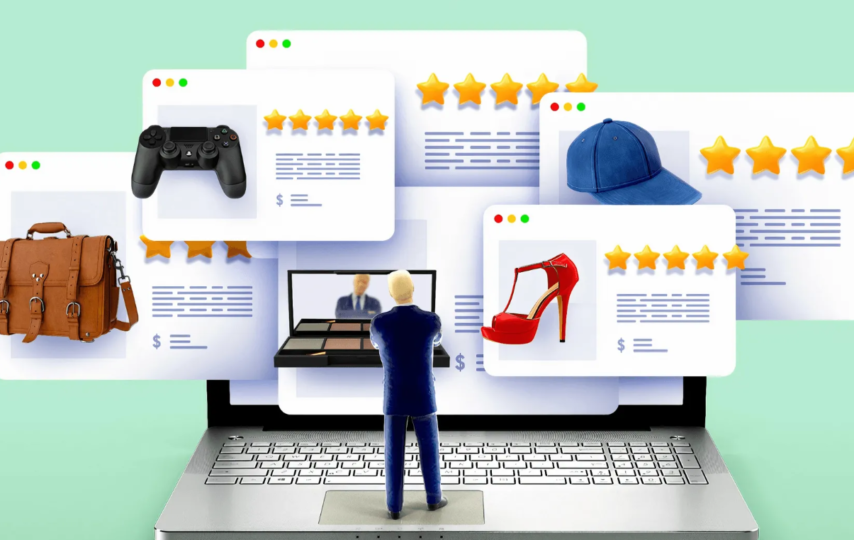It’s critical to evaluate the leading companies in the market in 2024, taking into account their advantages and disadvantages as well as the special value they provide to both buyers and sellers. Let’s have a close look at the top ten e-commerce platforms that are currently influencing the ecosystem of digital commerce.
eWorldTrade
One of the most eminent names at the highest point of the list of leading global e-commerce marketplaces offering transparent services is eWorldtrade. They connect buyers and suppliers globally.
Features:
- B2B marketplace that links buyers and suppliers worldwide.
- Multilingual assistance for users from around the world.
Pros:
- The process of verifying the authenticity and dependability of suppliers.
- For purchasers, the RFQ system expedites the sourcing procedure.
Cons:
- Global Sources and Alibaba are two well-established competitors.
- Communication and language barriers for non-native English speakers.
Amazon
Since its founding in 1994, Amazon has grown to become the largest online retailer in the world, operating on several different continents. With its extensive product selection and perfect user interface, Amazon is still the benchmark for the best online retailer.
Features:
- Extensive product catalog with nearly every category possible.
- unified user experience with tools like customized recommendations and one-click shopping.
Pros:
- Reliable and quick deliveries are ensured by an effective logistics network.
- strong resources and support for sellers.
Cons:
- Disagreements about the way employees are treated and the effects on the environment.
- Fake reviews and counterfeiting are persistent problems.
eBay
Since its inception in 1995, eBay has revolutionized the concept of consumer-to-consumer commerce, providing a platform for individuals to buy and sell a diverse array of goods. With its auction-style listings and fixed-price options, eBay offers something for everyone.
Features:
- Fixed-price options for immediate purchase.
- eBay Motors for buying and selling vehicles and parts.
Pros:
- Wide variety of unique and hard-to-find items.
- Seller-friendly policies like free listings and low fees.
Cons:
- Buyer protection policies sometimes favor buyers over sellers.
- High competition with similar items listed by multiple sellers.
AliExpress
As a member of the Alibaba Group, AliExpress has become a popular choice for consumers on a tight budget looking to purchase a variety of goods straight from Chinese manufacturers. Even with problems with quality control and delivery times, AliExpress is still a major force in the world of online shopping.
Features:
- Assistance with dropshipping for business owners.
- Multiple language assistance for accessibility across the globe.
Pros:
- Easy access to Chinese suppliers and manufacturers.
- minimal overhead for companies that drop ship.
Cons:
- Protracted shipping periods, particularly for purchases coming from abroad.
- Certain products have problems with quality control.
Walmart
Walmart, a company with strong roots in traditional retail, has made a smooth transition to the digital sphere by utilising its vast network of locations to provide an uncluttered omnichannel shopping experience. Walmart is becoming more and more entrenched in the e-commerce space as a result of its marketplace initiative, which draws both buyers and sellers.
Features
- Features include fuel discounts and free delivery as part of the Walmart+ subscription service.
- marketplace that gives independent vendors access to a larger market.
Pros:
- Reputable brand with a solid track record of cost and value.
- Options for easy pickup and delivery for time-pressed consumers.
Cons:
- The marketplace platform’s seller base is comparatively smaller.
- inconsistent quality of goods from independent vendors.
Rakuten
Originating in Japan, Rakuten is an online retailer that prioritizes personalization and customer loyalty by providing a customized shopping experience based on individual preferences. Despite intense competition and costly operating expenses, Rakuten stands out in the bustling market thanks to its dedication to innovation.
Features:
- You can exchange your Rakuten Points for cards for gifts and other prizes.
- For quick shipping, use Rakuten Express delivery service.
Pros:
- Emphasis on individualized shopping experiences and client loyalty.
- many options for earning money through cashback and referrals.
Cons:
- Limited market share in countries other than the US and Japan.
- worries regarding the security and privacy of data.
Wildberries
Since its founding in 2004, Wildberries has grown quickly to become Russia’s leading online marketplace, meeting a wide range of customer demands. Wildberries is well-positioned to reach a wider market while upholding its dedication to excellence and client satisfaction as a result of its entry into foreign markets.
Features:
- Wide range of products, including household goods, electronics, and clothing.
- Localized services designed with Russian customers in mind.
Pros:
- The leading Russian online marketplace has a devoted clientele.
- dedication to both client satisfaction and quality.
Cons:
- Competition from both domestic and foreign businesses.
- obstacles posed by language to non-Russian speakers.
Etsy
With a focus on handmade, vintage, and creative products, Etsy has developed a vibrant community of creatives and artisans and provides discriminating customers with a one-of-a-kind shopping experience. Even in the face of competition and restrictions imposed by niche markets, Etsy’s commitment to helping small businesses never wavers.
Features:
- Independent sellers offering handcrafted, vintage, and creative goods.
- marketplace that is driven by the community and helps buyers and sellers connect.
Pros:
- A welcoming community for creatives and skilled workers.
- low initial costs and reasonable listing fees for sellers.
Cons:
- Reliance on Etsy’s rules and pricing schedules.
- issues with copyright violations and counterfeiting.
Shopify
Shopify is a top e-commerce platform that makes it easy for business owners and small enterprises to launch and grow their online stores. Shopify offers a comprehensive range of resources and instruments that allow sellers to establish their brands and engage with customers worldwide.
Features:
- Integrated checkout and payment processing options.
- Tools for marketing and SEO that increase traffic and revenue.
- Mobile store management app for the go.
Pros:
- A large app store with a lot of features and functionalities.
- dependable resources and customer service.
Cons:
- Transaction fees and monthly membership fees can add up.
- competition from BigCommerce and WooCommerce, two other e-commerce platforms.
Alibaba
Alibaba, the world’s leader in e-commerce and technology that links companies and customers worldwide, rounds out our list. Alibaba keeps pushing innovation in international trade with its vast ecosystem of services, opening the door for a more digitally connected and interconnected future.
Features:
- B2B marketplace that links companies with manufacturers and suppliers.
- Alipay is a secure online payment platform.
Pros:
- The Trade Assurance program gives purchasers peace of mind.
- A unified network of services that includes payment methods and cloud computing.
Cons:
- Worries about substandard goods.
- rivalry with other B2B marketplaces and platforms.
The Wrap Up
In 2024, these top 10 marketplaces will be crucial for navigating the ever-changing e-commerce landscape because they emphasize creativity, interaction, and customer-centricity. These e-commerce giants continue to be at the forefront of development, creativity, and possibilities in the growing quickly digital marketplace as both consumers and businesses adjust to the changing times.
Q/A
Q1: How can I identify the best ecommerce marketplaces for my business?
A1: Start by understanding your target audience and product niche. Research popular ecommerce platforms, analyze their user demographics, and evaluate if they align with your brand and products.
Q2: What criteria should I consider when choosing an ecommerce marketplace?
A2: Key criteria include the platform’s audience size, fees, ease of use, payment methods, and marketing tools. Assess the platform’s policies, customer support, and integration capabilities to ensure they match your business needs.
Q3: Should I consider international marketplaces for my ecommerce business?
A3: If your products have global appeal, exploring international marketplaces can broaden your customer base. Evaluate the platform’s reach, language options, and shipping capabilities to ensure compatibility.



